By Mustapha Salisu
This story examines the 2024 Kano State Epidemic Preparedness and Response (EPR) budget allocations for combating measles, revealing the implications of untimely fund releases and the government’s handling of the disease. In this report, Mustapha Salisu investigates discrepancies surrounding measles funding in Kano, raising questions about the allocated funds and the impact on patient suffering.
In 2024, Kano State allocated N500 million for Epidemic Preparedness and Response, adding to the N400 million allocated both in 2022 and 2023 each.
Despite this funding, the cases of measles surge. According to the Nigeria Centre For Disease Control (NCDC), 1,379 suspected cases were recorded between January to November of 2023 alone in the State. This is also aside from a disputed March 2024 outbreak by the Kano State Government.
What is Measles
Measles is a highly infectious viral disease caused by a virus that belongs to the group of Morbilliviruses of the family Paramyxoviridae. Transmission is through aerosol droplets or direct contact with the nasal and oral secretions of an infected person to susceptible individuals, especially children between the ages of 9 months to 15 years.
Measles still remains a major health problem in the tropics and subtropics despite the availability of potent vaccines; it is estimated that measles was responsible for 136,000 globally in 2022 mostly among unvaccinated or under-vaccinated children under the age of 5 years.
The virus infects the mucous membranes of exposed individual and then spreads to other part of the body. Measles is known to infect only human with no known animal reservoir. Measles has an incubation period of about 10 days with a range of 7 to 21 days.
It is characterized by prodromal fever, conjunctivitis, coryza, cough and presence of Koplik spots. A characteristic maculopapular rash appears on the third to seventh day beginning on the face and become more generalized.
Measles In Kano
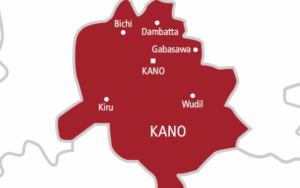
On the 3rd of March 2024, several news dailies reported an outbreak of the disease in some communities within Kano Metropolis.
Meanwhile the State Government swiftly responded by debunking the stories of measles outbreak in the state.
Despite dismissing reports of the outbreak, the disease persists.
Victim Narrates Ordeal
Mal. Kasim Gambo is a father of twins living at Zoo Road in Kano metropolis shared his experience of his twins contracting the Measles disease.
“In March, I returned home to find my daughter Hassana shivering with a fever. Upon closer observation, I noticed her eyes had turned red with rashes appearing below her lips,” he said.
“I rushed her to a private hospital for treatment, and she recovered after receiving a series of medications.”
Barely a week later, Hassana’s twin brother Hussaini also contracted the disease, and they took him to the government-owned Hasiya Bayero Paediatric Hospital.
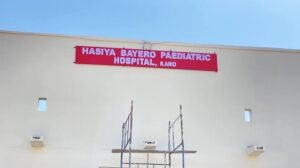
The experience was unpleasant compared to the private hospital.
“One night, Hussaini displayed similar symptoms to his sister. We rushed him to the hospital, where a doctor attended to us, but we had to pay for lab testing outside the facility. The doctor explained that their equipment sometimes gives inaccurate results, which is why they asked us to do the lab test elsewhere. We paid N1000 for the test, despite the hospital being supposedly free.”
Malam Kasim expressed his dismay at the challenges they faced at the hospital’s pharmacy.
“After doing the lab test, we were told to come back the next day for the medicine. I arrived at the hospital by 11 am, but the lady in charge of the pharmacy refused to administer the medicine, saying she had already filled out the log book for the day. I had to seek the hospital registrar’s intervention before she released the drugs.”
Malam Gambo appealed to the government to pay close attention to the staff at government-owned hospitals due to the ill treatment of patients and their relatives.
The Abuja Declaration Act Vs Kano Health Budget
When African Union member states met in Abuja, Nigeria, in April 2001, they committed to allocating 15% of their government budgets to health. The commitment, which was made by heads of African countries and is now known as the ‘Abuja Declaration’, is a collective effort to promote increased funding for the health sector in the region.
The resources were required to address the pressing health challenges of the day, including HIV and AIDS, Malaria and Tuberculosis.
However, about 23 years after this commitment was made, many countries, including Nigeria, have not found the way or the will to meet this target. A review of the 2024 proposed Nigeria’s National budget indicates that only about five per cent of the total budget is allocated to the health sector. Of the total N27.5 trillion proposed Nigeria’s National budget for 2024, tagged ‘Budget of Renewed Hope’, the health sector which is already grappling with various challenges got N1.38 trillion (5.03 per cent).
Meanwhile, Kano State over the years had been applauded for consistently committing above the Abuja declaration act which Nigeria’s health budget is yet to attain.
Notably in 2022, Kano committed N33.9 billion (16%) to her Health budget, while in 2023 the state allocated N39.1 billion (17%) and a whopping N51.4 was earmarked for 2024 budget placing the score at (16.5%) and well commendable effort.
The big question here is not “who has reached the target?” because Kano’s ability to meet the target has varied over time, and according to Health Experts, Dr. Nkechi Olalere and Ms. Agnes Gatome-Munyua in one of their reports tagged “Public Financing For Health in Africa,” they asserted that, “15% of an elephant is not the same as 15% of chicken”.
Rather, the questions should be “has there been a difference?”, “has it resulted in real progress in health indicators?” and ultimately “are people healthier and more prosperous?” The responses to these are more nuanced.
Kano’s EPR Funds and The Epidemiology & Control Of Outbreaks Funds
Kano’s EPR funds are intended for responding to disease outbreaks. In 2022, N400 million was allocated, the same amount in 2023, and an increase to N500 million in 2024. However, an insight into the 2022 budget performance revealed that no funds were released for EPR activities, a trend that continued into 2023 and 2024.
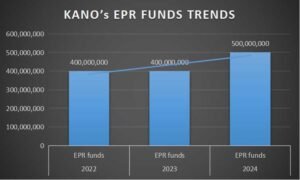
In addition, the Epidemiology And Control of Outbreaks funds which caters for diseases like CSM, Measles, Cholera etc, with allocations of N40 million in both 2022 and 2023, increased to N200 million in 2024, but yet, just the sum of 2 million naira release was recorded between January to August in 2023 budget alone, with no releases recorded in the 2022 full year actuals.
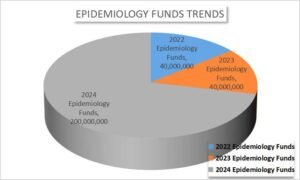
Government Speaks on Utilisation of EPR Funds
Despite this two categories of funds with significant increases, measles disease still persists in Kano. Dr. Abdulwahab Kabir Sulaiman, Kano State Epidiomologists disclosed to this reporter what informed the increase in the EPR funds over the years was as a result of the Kano State Joint External Evaluation (JEE), being among the first done at sub-national level in Nigeria that assessed the Health Security core capacities of the state, with a total preparedness of 47% as at 2021.
Asked how much is dedicated specifically for measles outbreaks in the EPR funds as the disease still persists in the state, Dr. Abdulwahab disclosed to this reporter that there is no dedicated funds specifically channeled for measles because the EPR funds is a contingency fund so once there is an outbreak the funds are utilised without waiting for administrative protocols.
He added that the funds can not be allocated to measles unless there is an outbreak of the disease and until now, the state has not confirmed any.
“Yet we get sporadic cases here and there in some facilities base on clinical suspicion of physicians and are being managed accordingly by assisting people with drugs” he said.
“So base on national protocol only the Governor or Commissioner of Health on behalf of the Governor can declare an outbreak to avoid panic. So the EPR funds can be utilised once measles is confirmed”
Health Budget Expert Speaks
As result of efforts of a coalition called the Kano State Health Security Advocacy Team, Kano became the first state in Nigeria to create a budget line for EPR activities with the initial budget of 300 million naira approximately $660,000 in 2021.
Salisu Yusuf is a Health Budget Expert in Kano State, he added that the coalition helped secured EPR budget allocations in each of Kano’s 44 local government areas in the fiscal year 2021, which were increased by 50% in 2022.
Yusuf echoed that ideally for every quarter 25% of funds release for a specific item is supposed to be seen and by the end of 4th quarter 100% releases should have been recorded.
“But, yet it is unfortunate you witness 0.00 budget performance in a quarter or a year”
On issues of suspected measles and how it persists, he disclosed that the Emergency Operation Centre (EOC) which was initially set up to handle polio cases now caters for measles and other diseases also but yet some children have zero doses of vaccination as they are not placed on routine immunization from birth till age 5.
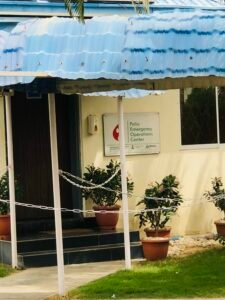
Yusuf revealed the EOC do claim that the EPR Funds are meant for the Centre, so they won’t be utilized until cases like measles are officially declared as an outbreak. The implication of this is that before measles is declared an outbreak several victims might have passed through a lot of pain and can even lead to casualties.
Key Takeaways:
This report investigates the disconnect between Kano State’s increasing budgetary allocations for healthcare emergencies and the persistence of measles outbreaks.
– The report calls for increased budget transparency and accountability, demanding public disclosure of allocated and disbursed funds.
– It emphasizes the need for dedicated funding streams for specific diseases like measles within the EPR budget.
– Streamlining outbreak declaration procedures to expedite access to emergency funds is crucial.
– Strengthening budget accountability is vital to effectively combat measles outbreaks in Kano.
The report revealed that by ensuring allocated funds are released and used efficiently, Kano can improve its public health response and protect its citizens.
This report is sponsored by Nigeria Health Watch.


